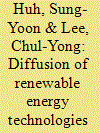| Srl | Item |
| 1 |
ID:
132658


|
|
|
|
|
| Publication |
2014.
|
| Summary/Abstract |
Renewable energy technologies (RETs) have attracted significant public attention for several reasons, the most important being that they are clean alternative energy sources that help reduce greenhouse gas emissions. To increase the probability that RETs will be successful, it is essential to reduce the uncertainty about its adoption with accurate long-term demand forecasting. This study develops a diffusion model that incorporates the effect of competitive interrelationships among renewable sources to forecast the growth pattern of five RETs: solar photovoltaic, wind power, and fuel cell in the electric power sector, and solar thermal and geothermal energy in the heating sector. The 2-step forecasting procedure is based on the Bayus, (1993. Manage. Sci. 39, 11, 1319-1333) price function and a diffusion model suggested by Hahn et al. (1994. Marketing Sci. 13, 3, 224-247). In an empirical analysis, the model is applied to the South Korean renewable energy market.
|
|
|
|
|
|
|
|
|
|
|
|
|
|
|
|
| 2 |
ID:
166463


|
|
|
|
|
| Summary/Abstract |
The global energy efficiency market is expanding, and efforts to distribute highly energy-efficient household appliances continue worldwide. It is important to understand consumer attitudes towards household appliances with different energy efficiencies in order to create energy savings effects in the household sector. This study analyses consumer preference for electric rice cookers, and assesses the energy-saving and emission-reduction effects of a rebate program in South Korea. The preference data was collected from choice experiments, and then analysed using a mixed logit model. Estimation results show that there is heterogeneity in consumer preference for all attributes of the rice cooker, and consumers place a high importance on price attribute. The rebate program in the rice cooker market also has a considerable effect on consumer purchase decisions, and results in an annual reduction of 83.88 GWh of electricity consumption and 37,200 tons of CO2e, when a 10% rebate is provided for 1st grade energy-efficiency products. Several policy implications for the energy-efficiency market and energy-labeling program are suggested, based on the results of the analysis.
|
|
|
|
|
|
|
|
|
|
|
|
|
|
|
|